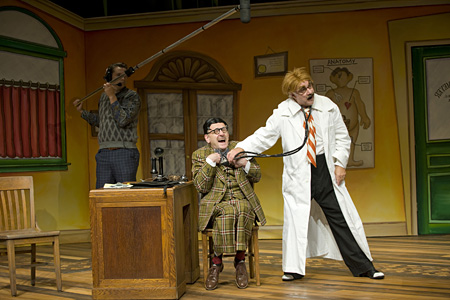 In three hours I’ll be sitting in a rehearsal studio in Lenox, Massachusetts, watching John Douglas Thompson give the first reading of the latest revision of Satchmo at the Waldorf, the one that I wrote last month at the MacDowell Colony. I’ve never seen this version of the play or heard it read out loud. John, Gordon Edelstein, and I feel pretty good about it, but hard experience has taught me that you never know whether a show works, or how well it works, until you see it done. All I know is that we have three weeks to get it right.
In three hours I’ll be sitting in a rehearsal studio in Lenox, Massachusetts, watching John Douglas Thompson give the first reading of the latest revision of Satchmo at the Waldorf, the one that I wrote last month at the MacDowell Colony. I’ve never seen this version of the play or heard it read out loud. John, Gordon Edelstein, and I feel pretty good about it, but hard experience has taught me that you never know whether a show works, or how well it works, until you see it done. All I know is that we have three weeks to get it right.
Send some friendly thoughts my way this afternoon–and tonight.
Archives for July 2012
TT: Lookback
 From 2004:
From 2004:
To be sure, the one thing a new friend can never do for you is say I knew you when, and I find it rather sad that there are so few people in my life who can speak those words. None of my closest friends in Manhattan knew me when: we didn’t meet until after I’d figured out who I was and what I wanted to become. On the other hand, the friends of our youth present their own problems. They are part of the train of memories that we all pull behind us, the one that grows longer with each passing day, and for that reason harder to pull….
Read the whole thing here.
TT: Almanac
“Man is the only being who knows he is alone.”
Octavio Paz, The Labyrinth of Solitude
TT: Here we go
 Today I drive to Lenox, Massachusetts, where I’ll be spending the next few weeks. Rehearsals for Satchmo at the Waldorf, my first play, begin tomorrow at noon, and the show opens at Shakespeare & Company on August 22.
Today I drive to Lenox, Massachusetts, where I’ll be spending the next few weeks. Rehearsals for Satchmo at the Waldorf, my first play, begin tomorrow at noon, and the show opens at Shakespeare & Company on August 22.
I expect to post with fair frequency between now and then, but don’t be surprised if I drop out of sight on occasion. John Douglas Thompson, Gordon Edelstein, and I are going to be incredibly busy, which suits me just fine. I’ve been waiting for weeks to roll up my sleeves and get cracking. This is the moment I’ve been waiting for.
Theater people don’t wish one another luck–they say “Break a leg” or Merde! I invite you to supply a euphemism of your own choosing. Whatever it is, wish me plenty of it.
TT: Just because
The King Cole Trio, with Oscar Moore on guitar and Johnny Miller on bass, perform “Errand Boy for Rhythm” in 1946. The dancer is thought to be Nadine Robinson, Nat Cole’s first wife:
(This is the latest in a series of arts-related videos that appear in this space each Monday and Wednesday.)
TT: Almanac
“Imagination is the beginning of creation. You imagine what you desire; you will what you imagine; and at last you create what you will.”
George Bernard Shaw, Back to Methuselah
TT: Laughter in the dark
My drama column returns to The Wall Street Journal today after a two-week hiatus. I flew out to Minneapolis on Wednesday to see the Guthrie Theater’s revival of Neil Simon’s The Sunshine Boys. Here’s an excerpt.
* * *
Do Neil Simon’s plays have a future? Nobody was asking that heretical question a quarter-century ago, back when the author of “The Odd Couple” was still the most popular and successful playwright on Broadway. But American comedy has mutated almost beyond recognition in the ensuing years, and it’s been so long since Mr. Simon’s glory days that you can’t help but wonder whether his quaint one-two-here-comes-the-wisecrack style is destined to vanish into the same memory hole that long ago swallowed up the likes of Bob Hope and Red Skelton.
 I recently saw an Off-Broadway production of “Lost in Yonkers” that was so persuasively staged and acted as to make me wonder for the first time whether Mr. Simon’s best plays might possibly be ripe for revival. I felt the much same way after flying out to Minneapolis on Wednesday to catch the Guthrie Theater’s more conventional but genuinely satisfying new production of “The Sunshine Boys,” Mr. Simon’s 1972 play about a comedy team whose long partnership has dissolved in acrimony and spite….
I recently saw an Off-Broadway production of “Lost in Yonkers” that was so persuasively staged and acted as to make me wonder for the first time whether Mr. Simon’s best plays might possibly be ripe for revival. I felt the much same way after flying out to Minneapolis on Wednesday to catch the Guthrie Theater’s more conventional but genuinely satisfying new production of “The Sunshine Boys,” Mr. Simon’s 1972 play about a comedy team whose long partnership has dissolved in acrimony and spite….
The premise of “The Sunshine Boys” is neatly pointed: Willie Clark (Peter Michael Goetz) and Al Lewis (Raye Birk) worked together for 43 years, at the end of which Al decided that he’d had enough of show business. His abrupt retirement enraged Willie, who wasn’t ready to quit the stage and now regards his old partner with a volatile blend of pride and rancor: “As an actor, no one could touch him…as a human being, no one wanted to touch him.” The two men haven’t spoken for a decade as “The Sunshine Boys” gets underway, and Willie affects to be perfectly happy to leave it that way. Enter Ben (Robert O. Berdahl), his nephew and manager, who hopes to reunite Lewis and Clark for a TV special. Al is game, but Willie isn’t–at least not at first.
As always, Mr. Simon plays for laughs and gets them, especially in the riotous scene in which Lewis and Clark re-enact their knockabout vaudeville act for the TV cameras. But he is also alert to the underlying pathos of the situation, for the septuagenarian Willie, who lives alone in a crumbling residential hotel, is all too clearly in the early stages of dementia (though nobody would have thought to call it that in 1972). Desperate to cling to his independence, he refuses to come to terms with the diminished thing that is his life….
Gisselman, who directed the Guthrie’s 2006 revival of “Lost in Yonkers,” has staged “The Sunshine Boys” in the same straightforward vein. While it’s not especially daring, nobody makes the mistake of hitting the jokes too hard, and there are more than a few moments when pain peers through the laughter….
Mr. Goetz, who reminds me of Art Carney in his irascible old age, has the lion’s share of the best lines and delivers them with growling gusto. Would, though, that Mr. Gisselman had encouraged him to be more brutal…
* * *
Read the whole thing here.
TT: Almanac
A man of pleasure is a man of pains.
Edward Young, Night Thoughts
